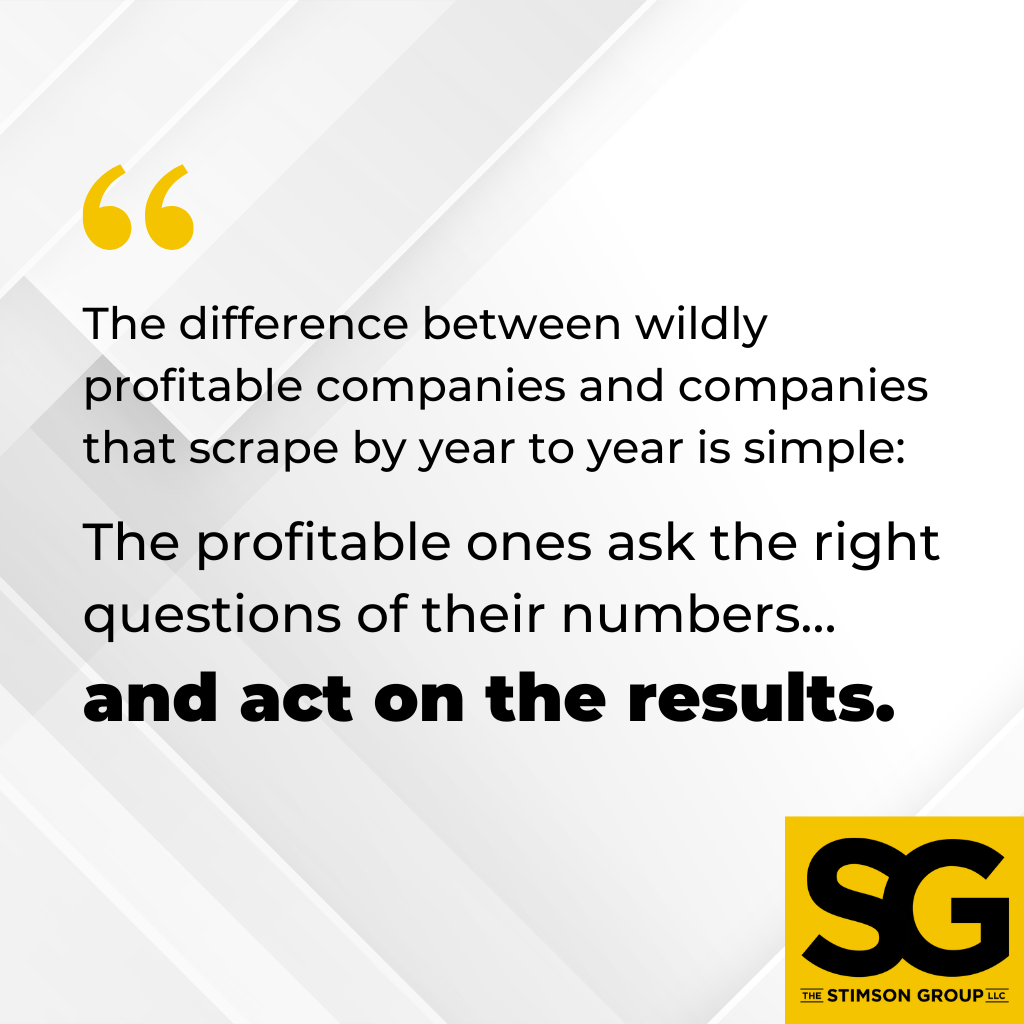
Listen instead on your Monday Morning Drive:
I work with companies that have fabulous spreadsheets. They produce endless data and reports. They hold monthly management meetings where they analyze their numbers.
But the analysis isn’t actionable because it doesn’t ask the right questions.
Recently, a client called me with a problem: His revenue was way up, and even though he didn’t increase his headcount, he wasn’t making more money.
It didn’t take long to figure out why: 10–15% of his staff was getting 10% utilization. That’s a huge cost that doesn’t scale.
This client’s data was accurate. It showed that Tom only works 10 percent of the time as a billable person, and the rest of the time he’s very helpful around the office.
“Get rid of Tom,” I said. “Or find something better for Tom to do.”
My point is this: The questions we ask based on our data are more important than whether the data itself is correct.
What 9/11 Taught Us About Math
In 2001, we had a recession. Then 9/11 happened.
The airspace shut down. Shows that were completely set up got struck, loaded on trucks, and sent home. We struggled to get paid because we weren’t creative about billing back then.
From early September until the end of the year, there was no work. Then 2002 shows started to cancel. A third of annual revenue vaporized overnight.
In the midst of this chaos, a big competitor did something the industry thought was abhorrent: They announced to anyone who would listen, “We’ll give you anything in our warehouse for free. Just pay for our talent.” A 100 percent discount on equipment offered to anybody who would take it.
I remember thinking that those guys were pretty clever. They would take business away from us. Customers would try them, like them, and not come back.
But from a math standpoint, what they were doing was really smart.
They were creating revenue to cover their expenses. Gross profit on jobs would be low, but it would cover the direct costs on staff.
Old rental guys didn’t see how that would work. “How do you pay for the gear?” they asked.
Simple: You pay for the people. The gear takes care of itself.
That was a major step in my education. It’s about the service. It’s about the people.
We need to make money on labor. Every time a person works on a job, you need to profit from their time. The flex money, the variable profit, is built into the equipment. We own equipment to reduce outside costs, but we don’t need to own everything.
Back then, we thought we had to own all our equipment and have very few sub rentals. We thought we had to have all our technicians on staff and very few freelancers. We were wrong.
Three Questions Your Numbers Should Answer
Business owners call me and ask, “What numbers should I look at?”
“What do you want to know?” I reply.
“How do I make money?”
That’s the healthiest question you can ask. Let me answer it with three more questions.
I’ve interviewed controllers and bookkeepers who can’t answer that basic question. “They take in more revenue than they have expenses,” they say.
That’s a simple mathematical answer. But philosophically, how do they make money? What revenue makes money and what revenue doesn’t?
I recently worked with an owner doing pretty well but struggling on profitability. He was leaving a million dollars a year on the table.
I looked at his numbers. He charged clients $300,000 for scenery over a year, and he spent $1.3 million on scenery. That million dollars was the profit he should’ve made. That scenery was probably worth $2 million, but he was afraid to sell it that way because it was a loss-leader. It helped win jobs.
“We can’t make as much money on scenery as we do on rental,” he said.
“Why not?” I asked. “Who told you that? Where did that rule come from?
Asking the right questions gets you to the right answers. Here are the three questions you need to ask.
Question One: How Do You Make Money?
What revenue makes money for you, and what revenue doesn’t?
All your revenue needs to make money. Validate what it’s making. Justify that revenue or pull the plug on that service.
Question Two: Which Costs Are Discretionary and Which Are Prescriptive?
Discretionary means you spend money because it makes a job go better. Prescriptive means you have to have it.
Are you using cost of goods sold correctly? Can you buy smarter? What’s a normal amount of sub-rentals in a busy month versus a slow month?
Here’s what happens when you give people bad data. I recently spoke with a sub rental manager who had been given bad information by management. “We average eight percent sub rentals per year, so as long as you don’t go over eight percent of revenue per job, you can keep sub-renting,” management said.
In busy months, he was short-changing jobs with sub-par sub rentals to save money. In slow months, he was renting gear they didn’t really need and paying too much for it.
He was being given bad data and responding appropriately to that bad data because nobody asked the right questions.
Question Three: Is Your Fixed Cost Helpful?
Your overhead isn’t for executing business. That’s cost of goods sold. All your below-the-line expenses (selling, administration, accounting, bookkeeping, warehouse managers, inventory managers, your sales team) are part of overhead.
Are they helpful all the time? Or do you sometimes wonder why they’re here?
If you can reconcile these three questions, you’ll find your way to better balance.
Setting Up Your Numbers Correctly
Many companies can’t access this data easily. Pulling the numbers requires extensive reporting no one has time to do.
But if you set your books up correctly and set your reports up wisely, if you know how to record data and parse data, and if your revenue categories align with cost of goods sold categories, it’s easy to pull out your key performance indicators. You can see how you’re doing and find out if you need adjustments.
The key is to ask permanent questions of your numbers. Don’t just ask ad hoc questions.

Management Accounting vs. Everything Else
Setting up your numbers the right way starts with understanding what kind of accounting you need.
There’s financial accounting, tax accounting, and management accounting. These are three different disciplines, often handled by three different people.
Financial accounting uncovers one set of facts. Tax accounting uncovers another. Management accounting is the one that’s always neglected.
Tax and financial accounting look backwards. Management accounting looks forward. We use numbers from the past to predict the future and make adjustments before it’s too late. That’s the key to making money.
As the owner, principal, or manager of your business, you probably handle the management accounting yourself. If you’re a larger firm with a five-person accounting team, you need someone on that team who understands management accounting.
The difference between wildly profitable companies and companies that scrape by year to year is simple: The profitable ones ask the right questions of their numbers… and act on the results.






Leave a Reply